Proctor's Mountain Classroom program set our sights on Salina, KS as we departed South Dakota. We visited The Land Institute to learn about their plant breeding programs as a part of our food systems curriculum. From Salina, we drove due east to Green Sulphur Springs, WV where we hiked into the hills for our wilderness solos.
Theresa '19:
It is our generation that can decide whether we will continue destroying our home, the earth, or make a change. Today it is almost impossible to replace the energy gained from fossil fuels with human labor. Agriculture plays a large role in the use of fossil fuels. Even organic farms require many machines, such as tractors, to sow seeds and harvest each year. 70 percent of the fields that we grow on globally are used for grains that are annual crops (plants that have to be replanted every year). The use of annual crops requires annual plowing, which causes nutrient leakage, carbon loss, greenhouse gas emissions, degraded lands, and the invasion of weeds.
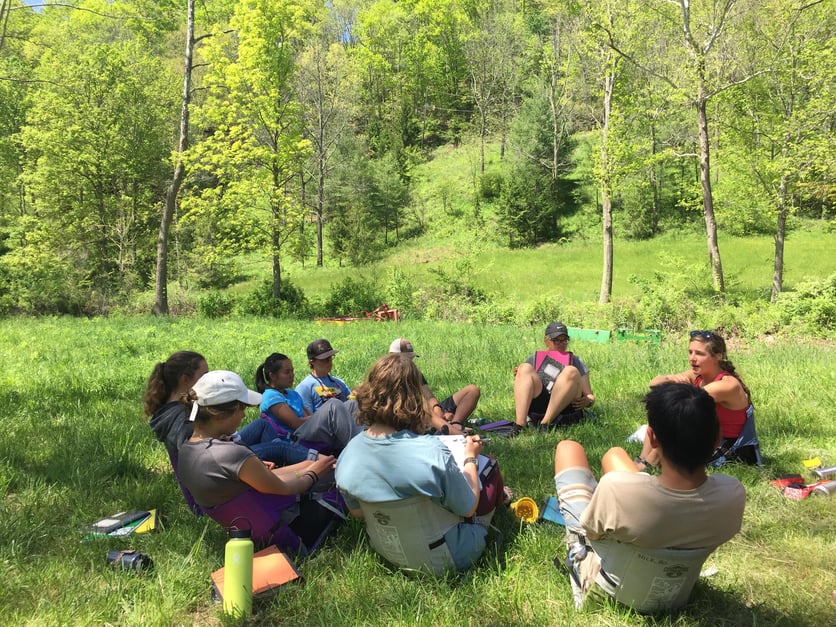
But there is hope: The Land Institute, a plant science center, has 200 acres of experimental fields in Salina, Kansas. They are developing a different approach to agriculture. Their mission is to revolutionize agriculture by domesticating wild perennial crops (plants that live more than two years), and in turn use fewer fossil fuels and synthetic chemicals. Perennial plants put 50 percent of their energy into roots, which makes them far more stable than annuals (annuals use 15 percent of their photosynthetic energy for roots) and able to survive extreme seasonal weather. These large roots also prevent soil erosion and sequester more carbon. Moreover, perennial crops are significantly less dependent on nitrogen-based fertilizers.
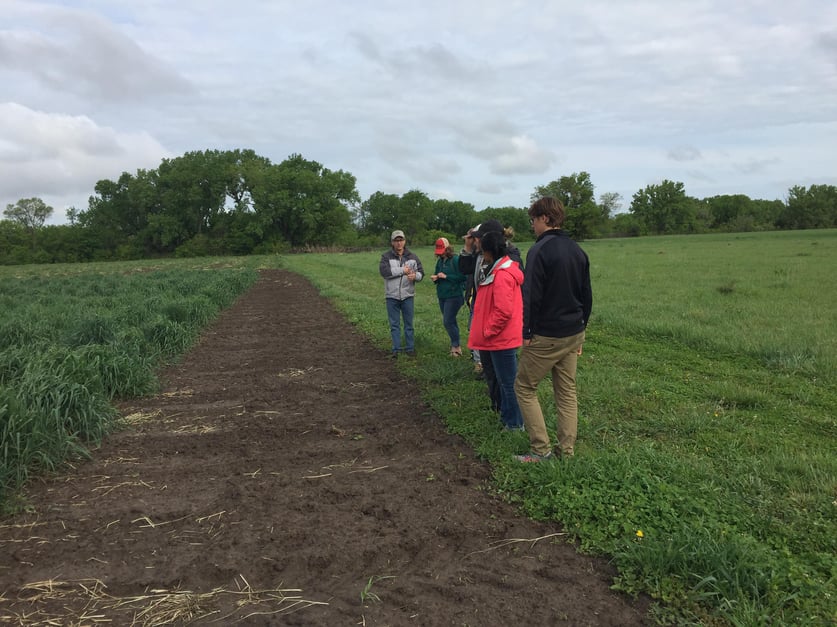
We spent the morning with Tim Crews at the Land Institute looking at the experimental fields. The mixture of short and long grass, the smell of yesterday’s rain, the warm sun, and the various shades of green all made us realize that from now on there won’t be any snow or freezing water bottles. We started our tour at a prairie where we saw similar characteristics to the desert and short grass regions that we have traveled through before, but at the same time there were new types of taller grass. Tim talked about the idea of either domesticating wild perennial crops or crossing annuals with their closest perennial relatives. He showed us a field where they grow Kernza, a domesticated, perennial grain. We also got to see the buildings in which researchers process the harvest from their test plants. At the end of the tour Tim gave us some Kernza flour as a gift, which we are going to use for delicious pancakes.
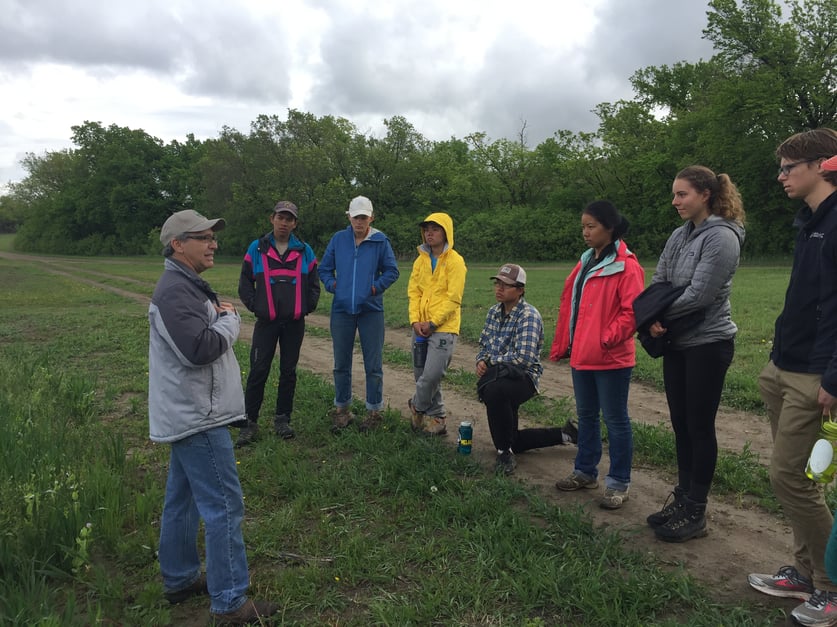
The process of crossing plants and domesticating wild crops takes longer than a lifetime because researchers at the Land Institute are not using genetic modification. Adding to the challenge, the Land Institute relies primarily on private donors for funding, which means they are encouraged to make rapid progress in order to keep such donors interested in their research. However, considering the increasing world population and climate change, it is invaluable to keep searching for more sustainable agricultural systems. Our visit to The Land Institute taught us to think long term about the health of society and biodiversity. I’ll leave you with a quote from Wes Jackson, the founder of The Land Institute: “If your life’s work can be accomplished in your lifetime, you’re not thinking big enough.”

Spencer '17:
The Mountain Classroom family temporarily separated for alone time and introspection over the last five days. It was time for our wilderness solo, which took place in the woods near Green Sulphur Springs on a property owned by Wood & A. Wood and A, who moved to West Virginia in the 80s, are a delightful couple who generously offered us their land for one of the most unique experiences of the term.
On May 5th, we arrived at the property in the drizzling rain and learned how to set up tarps—our new homes. For the first time in two months we slept alone under individual tarps. Even though rain continued throughout the night, most of us stayed relatively dry and warm despite not sleeping in a cozy tent with friends.
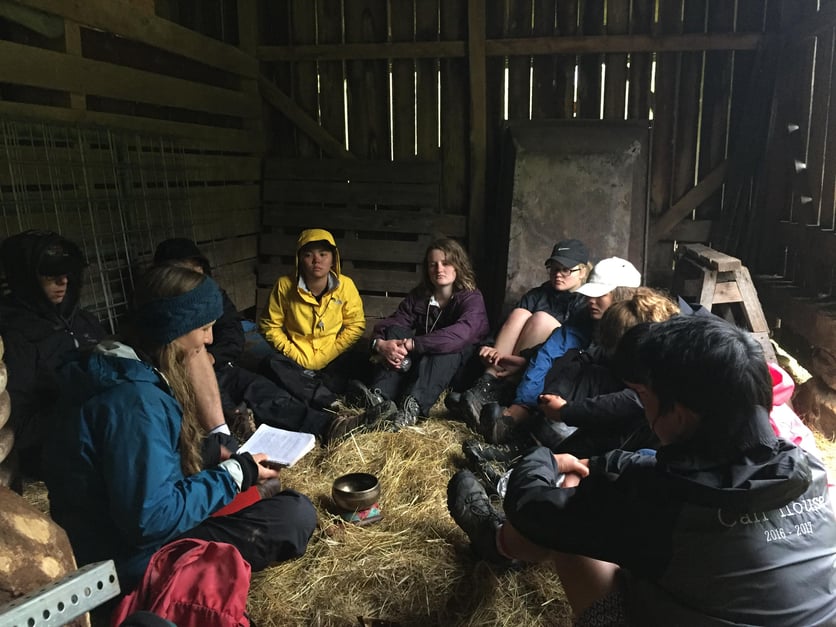
The next morning, we circled up in a barn near the base of the forest trails and had a final information session. We reviewed the protocol in the event of an emergency, and we were introduced to our own solo sites. Our sites divided our group of nine between two trails. The layout of our sites was quite straightforward: a main site where we were to live, a “driveway,” and a “mailbox.” We each set up our “homes” on the main site. Each day, we walked down our “driveway” to get to our “mailbox,” which is a tree where we adjust a bandana as a signal to Timbah and Coco that we’re well. After site assignments, we each shared a goal that we intended to achieve over solo. I hoped to journal as much as possible. Then, Coco rang the bell and the silence began. We decided to silently hike up as we transitioned into our solos. It was our first taste of serenity and the start of being in our own minds.

We hiked at a mellow pace because the trail was slippery and hilly, and our backpacks were jammed with food and books that we wanted to read. Nick was the first person we dropped off, and then one after another was left at their site. After more than an hour, Kelly and I were the only two left. Kelly seemed to be deep in her thoughts and a little apprehensive, so I whispered to her, “Our parents would think we’re losing our minds if they knew we’re about to spend four nights in the wilderness alone.” We chuckled at the drastic cultural differences between China and the U.S., and then, as Timbah’s bright yellow rain jacket appeared between the branches, we smiled at each other as a temporary goodbye. After that, it was a five-minute hike up to my site, “Hilltop Paradise.” After showing me my campsite’s perimeter, Timbah left. And starting that moment, it was just me and the plants and animals in Hilltop Paradise for the next string of days. I dropped my backpack and two gallons of water and set out to scout the campsite. The ground was relatively flat, though almost all spaces were slightly slanted. I finally decided on a spot and quickly set up the tarp to shelter me from the rain. Soon, I was warm and cozy in my sleeping bag. I took out The Giver and started reading, out loud. And at 19:13, I decided to go to bed.
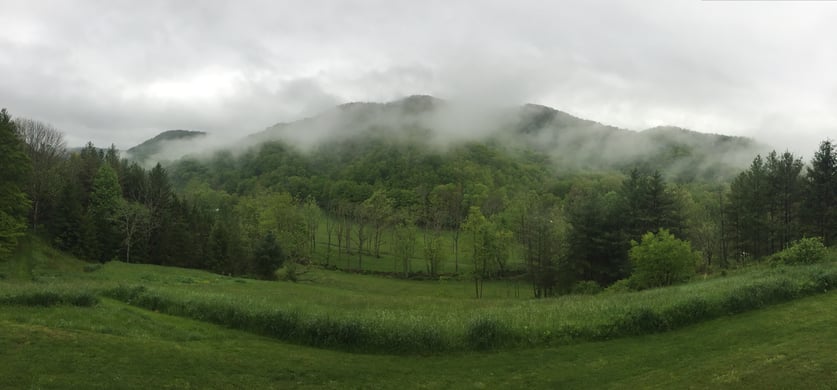
As I mentioned above, my goal for solo was to journal a lot, and I am proud to say, goal achieved. Here’s an excerpt from my days on solo.
May 7th Hilltop Paradise, WV, Solo day 2 (first full day)
I am completely dry! Last night, I drifted into sleep with the sound of the raindrops colliding with the top tarp. Every sound was amplified in nature’s quietude, and it was bizarrely comforting without another body next to me. It was a lovely reminder that I was not completely alone. Nature was with me.
07:31 I woke up and decided to change the flag before getting more sleep, so I did.
11:08 “Hello world,” I said as I woke up for the second time. The sun has been playing hide and seek, so the air felt a little chilly. I was trying to set a tone for my first full day, but as I lay warm and dry in my sleeping bag, I said to myself (out loud), “I don’t want to leave my sleeping bag! It’s so nice and dry.” And seconds after, I answered myself, “And I don’t have to!” So I pulled out my journal and started writing. Things are pretty good so far. No epiphany yet, but I feel good.
15:04 I’ve been singing, reading out loud, and having random conversations with myself. I LOVE IT.
16:09 I was overwhelmed by laughter. There I was, sitting on a wet, fallen log, looking at a sunlit mountain and chewing on a gigantic cucumber like a barbarian. This is not where I imagined myself being five years ago. I am entertained by the fact that I’m a girl from China, alone in the middle of West Virginia woods, enjoying myself like I do this daily. Life is weird.
16:58 Crap, what’s the day today?
19:23 I can’t tell if this plant right in front of my head is poison ivy or not.
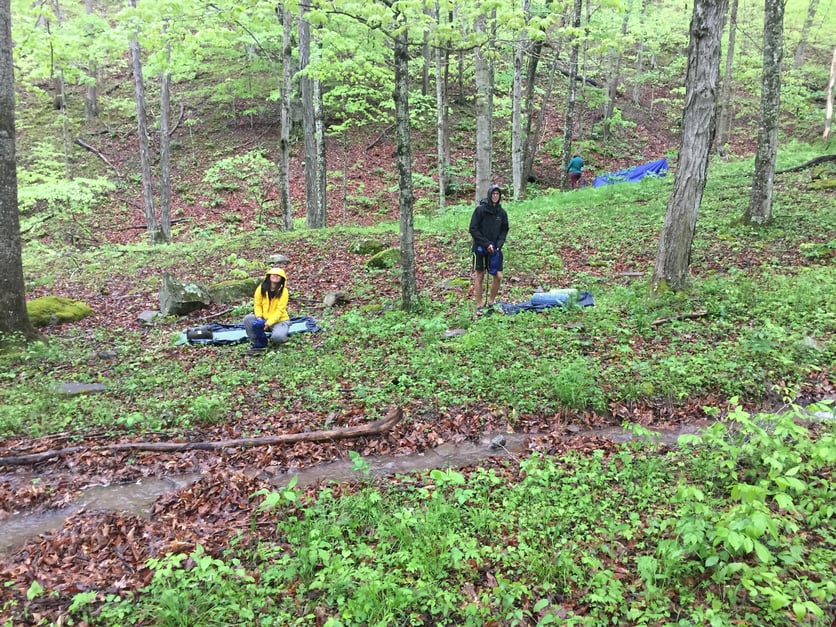
May 8th Hilltop Paradise, WV, Solo day 3
Didn’t sleep that well last night. I heard rustling close to my site at around 2200. It was loud thumping and branches breaking, so I made noise to scare whatever it was away. I don’t know what it was. It could be a coyote I guess. It’s kind of unsettling, knowing that something was so close to me when I was sleeping. As of 1142, I still can hear slight movement nearby.
12:02 I finally decided to check out what is making the noise. It was two deer! They skittered away as soon as I climbed out, but they look so adorable!
Random thoughts (last night): Every once in a while a plane will cross the sky. It reminded me of the disturbing fact that there aren’t many places on earth that are without a human trace.
14:51 I’ve been reading and I keep hearing the noises. I stepped out my tarp hoping to see Bambi again. No luck.
15:48 I spent the day in equanimity. I just read and read and journaled.
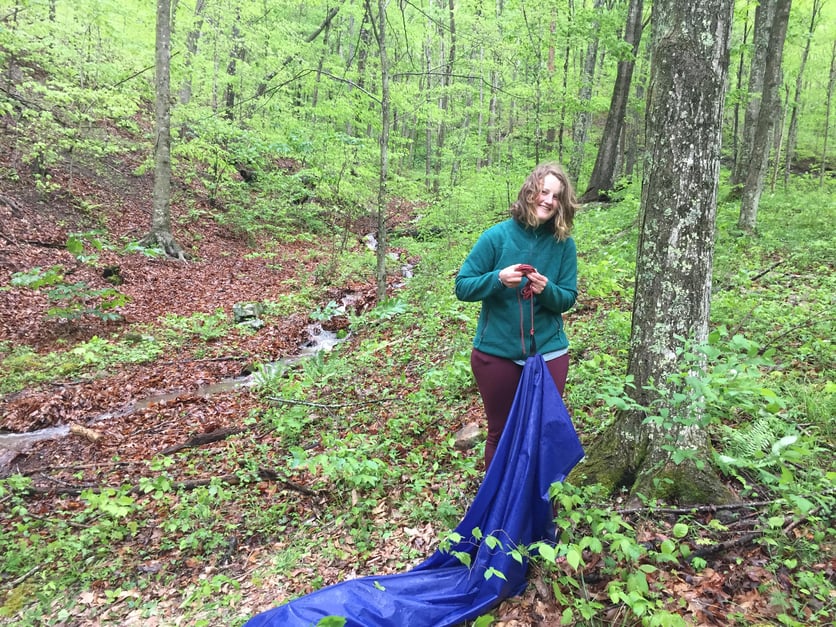
May 9th Hilltop Paradise, WV, Solo day 4 (last full day)
I cannot get over how freaking cool it is that I am sleeping with Bambi by my side each night! I know it could just be a rodent, a bear, or a coyote, but anyway, still cool.
09:18 The distinct smell of wet wood and grass permeated the air. I like the smell. I just realized today that all the birds start singing all at once near dawn. Not the most pleasant when I’m still trying to soak up every last bit of my sleep, otherwise very delightful. It’s nature’s live concert that consists of more instruments than I can distinguish.
I have nothing to do. I can’t remember the last time this statement wass completely true, but as for now, I have absolutely nothing to do other than just be with me and my peace of mind.
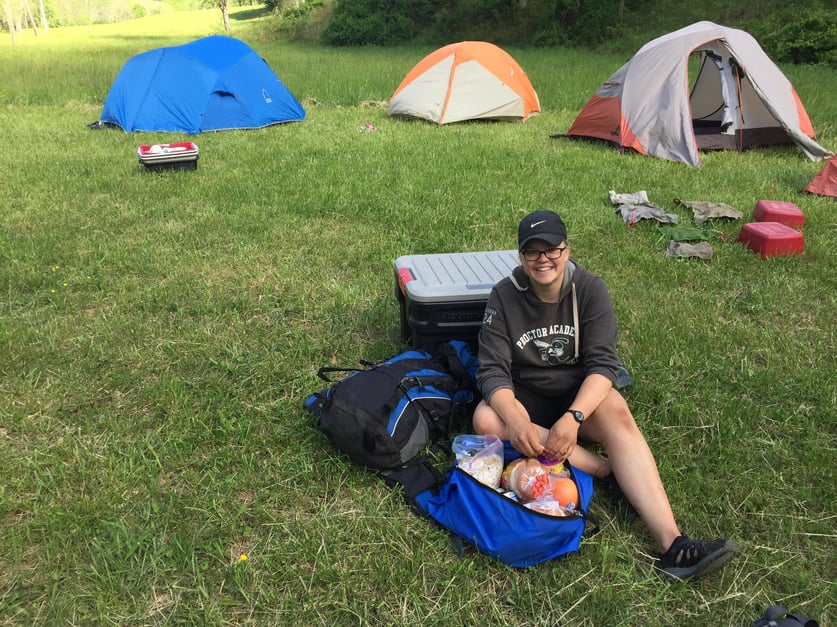
On May 10th, our last bit of solo, we were picked up at 14:30 sharp. Timbah and Coco started from the top of the trails and picked us up one by one to hike back to our basecamp. Again, it was a silent hike down, our last grasp of solitude and reflection. Then, as we reconvened at the bottom, all of us hugged and jumped around each other with ecstasy. The brief separation, while providing me with precious personal space and time, also reminded me of the wonderful companionship in our community.
All of us appreciated the solitude, the silence, and the importance of having the time to be with only ourselves, to only worry about ourselves, and to only work on ourselves. And all of us appreciated, again, the wonderfulness of nature. I enjoyed the three books I’ve read over solo: The Giver, Elsewhere, and The Tracker. This quote from The Tracker seems to fit me best, and to sum up my experience: “Only by silence and rapt attention can anyone hope to feel the ripples in the flow of life in the woods —the various scolding of birds deeper in the woods, or the sound that crackles the branches against the rustle of the wind.”








